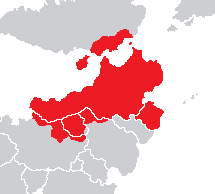User:Britbong64/Sandbox 4: Difference between revisions
Jump to navigation
Jump to search
Britbong64 (talk | contribs) No edit summary |
Britbong64 (talk | contribs) No edit summary |
||
| Line 70: | Line 70: | ||
|coordinates = | |coordinates = | ||
}} | }} | ||
The '''Rudolphine Confederation''' (''{{wp|German language|Weranian}}'': '''Eidgenossenschaft''') was a historical {{wp|confederation}} that ruled over much of north [[Euclea]] from its declaration in 1027 to the [[Weranian Revolution]] when it was replaced by the [[Republic of Werania]] in 1786. At its height it spanned across the entirity of modern day [[Werania]], [[Azmara]] and [[Alsland]] as well as southern [[Scovern]], northern [[Estmere]] and western [[Kirenia]]. | |||
==History== | ==History== | ||
*Founded in 1027 after King Rudolf led the Eidgenossenschaft (oath-fellowship) against the Verliquoians/Estmerish preventing their expansion into northern Euclea, in particular Borland. Rudolf was crowned as the Leader of the Eidgenossenschaft, commonly known as Emperor of the Rudolphine Confederation by Verliquoians. | *Founded in 1027 after King Rudolf led the Eidgenossenschaft (oath-fellowship) against the Verliquoians/Estmerish preventing their expansion into northern Euclea, in particular Borland. Rudolf was crowned as the Leader of the Eidgenossenschaft, commonly known as Emperor of the Rudolphine Confederation by Verliquoians. | ||
Revision as of 14:57, 7 September 2021
Rudolphine Confederation Eidgenossenschaft | |||||||
|---|---|---|---|---|---|---|---|
| 1027-1786 | |||||||
| Royal Seal | |||||||
 The Rudolphine Confederation at its greatest extent prior to the Amendist Wars in 1582. | |||||||
| Capital | No single/fixed capital (1027-1640) Westbrücken (1640-1786) de jure Wiesstadt (1640-1786) de facto | ||||||
| Common languages | Official: Weranian and Medieval Solarian | ||||||
| Religion | Official: Catholicism (1106-1607) | ||||||
| Government | Confederal elective monarchy (1027-1674) Confederal absolute monarchy (1674-1785) Confederal constitutional monarchy (1785-1786) | ||||||
| Rudolphine Protector | |||||||
• 1027-1051 (first) | Rudolf I | ||||||
• 1764-1785 (last) | Leopold III | ||||||
| Legislature | Tagsatzung | ||||||
| Historical era | Middle Ages Early modern period | ||||||
• Established | 1027 | ||||||
• Disestablished | 1786 | ||||||
| Population | |||||||
• 1582 | ~8,000 | ||||||
• 1786 | ~20,000,000 | ||||||
| |||||||
The Rudolphine Confederation (Weranian: Eidgenossenschaft) was a historical confederation that ruled over much of north Euclea from its declaration in 1027 to the Weranian Revolution when it was replaced by the Republic of Werania in 1786. At its height it spanned across the entirity of modern day Werania, Azmara and Alsland as well as southern Scovern, northern Estmere and western Kirenia.
History
- Founded in 1027 after King Rudolf led the Eidgenossenschaft (oath-fellowship) against the Verliquoians/Estmerish preventing their expansion into northern Euclea, in particular Borland. Rudolf was crowned as the Leader of the Eidgenossenschaft, commonly known as Emperor of the Rudolphine Confederation by Verliquoians.
- Initially the Confederation was mostly pagan being partly founded on entrenching pagan exceptionalism in northern Euclea. However there existed Sotirian communities with the imperial authority not *per se* repudiating Sotirianity.
- In 1106 Emperor Rudolf III converted to Sotirianity and begun a campaign of eradicating paganism in the confederation.
- Following Rudolf III's conversion the confederation gain papal permission to go on crusades - Ruttland, Alsland(?), Kirenia(?), Bonnlitz, Scovern(?), Caldia over the next half century
- Rivalry with the Third North Sea Empire in Caldia-Scovern and Maritime Guild in Kirenia.
- Reaches maximum extent prior to the Amendist wars.
- Amendist Wars leads to civil war in the Confederation and many of its members to leave the authority of the Emperor.
- Decline during the 17th century. This was accompanied by a centralisation of power by the imperial house starting under Otto IX (1646-1695) abolishing many of the rights of the monarchies concentrating power in the hands of the imperial house.
- Ten Years' War leads to the further destruction of the Confederation.
- Following the Ten Years' War the confederation continues centralising; this causes further discontent.
- 1785 - revolution creates a constitutional regime, which then becomes a republic a year later.
Politics
- Kinda a mix between the Old Swiss Confederation and Holy Roman Empire.
- Originally founded - basically when the Emperor requests troops to fight in a war, the constituent states send a levy. Most wars within the confederation are crusades against pagans(?) or against external threats. The central state also demands some taxes, but aside from that member states are basically autonomous.
- Following the Amendist Wars the Federal Diet (Tagsatzung) is founded, which consists of representatives sent from the states. This leads to increased conflict between the emperor and the Tagsatzung.
- In 1652 Emperor Otto IX revokes many noble privileges including the marginalisation of the Tagsatzung heralding the start of absolutism in the confederation.
- Following the Ten Years' War far more centralisation is pursued - more taxes, more authority to the church, less respect for ancient privileges. Tagsatzung increasingly marginalised in favour of absolutism.

